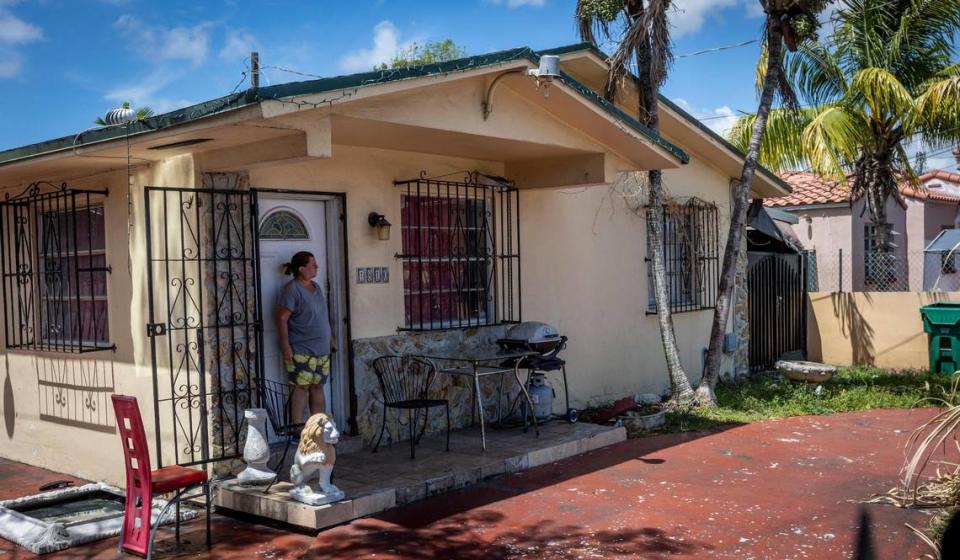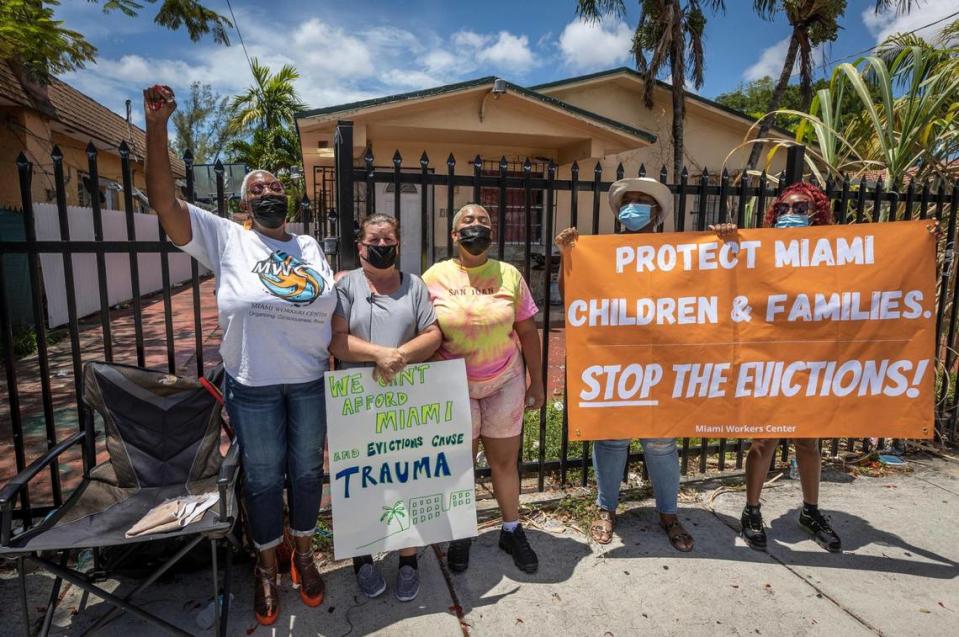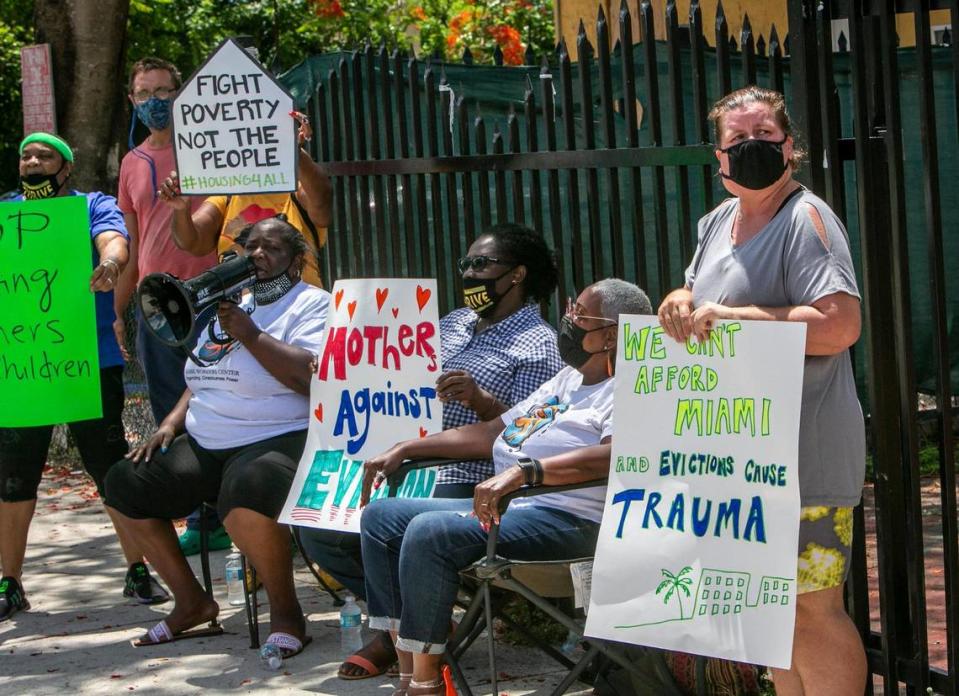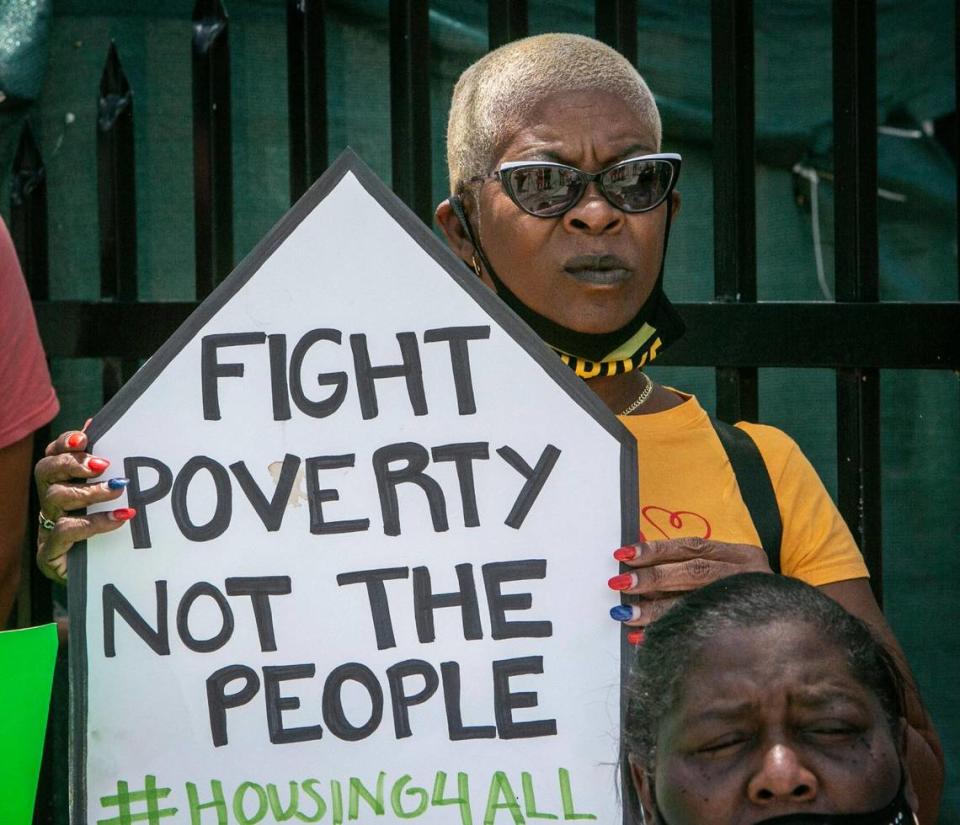This single mother in Allapattah was being evicted. Then her community stepped in.
In Elena Riech’s eyes, she did everything she was supposed to do.
When her partner of 16 years and father of her three kids passed away unexpectedly in his sleep in September, Riech dipped into the couple’s savings to pay her October rent of $1,700 for their three-bedroom home in Allapattah.
Then the suddenly-single mother applied for rental assistance with the federal CARES Act, which provided her the funds to pay her November and December rent.
But Riech’s landlord, New Cousin Investments LLC, decided the funds had taken too long to reach them. On January 11, the company took the first steps toward evicting Riech. It also turned down funds from the county’s Emergency Rental Assistance Program (ERAP), leaving Riech and her children in limbo under a looming eviction.
After a Miami Herald reporter called for this story, New Cousin softened its stance. Alexandra Sanchez, the attorney representing the company, said discussions are ongoing with Camillus House, the non-profit provider of care for people who are poor or homeless, on a way to pay Riech’s owed rent, which stretches back to January. The deal would put a stop to the eviction.
“We’re talking and we haven’t reached an agreement yet,” Sanchez said Wednesday afternoon. “There is an open dialogue but there is no final resolution. Everything is still the same as it was this morning on the legal side.”
Sam Gil, senior vice president of operations for Camillus House, confirmed the potential deal, although its details are not being made public.
“We have gotten a positive response to keeping Elena’s house and providing ongoing services to her family,” Gil said, describing the resolution as a “verbal agreement.”
“At the end of the day, we were able to find a solution that worked for both parties, and that’s what Camillus House is about.”

Evictions are coming
While Riech’s situation is highly unusual, it is legal. Both the federal program and county programs require landlords to sign a document agreeing to participate in the program, with funds distributed directly to the landlord. Without the landlord’s signature, tenants cannot use the financial aid, regardless of whether they qualify.
And the eviction rate in Miami-Dade County soon could be much higher. On June 30, the national eviction moratorium from the Centers for Disease Control and Prevention (CDC) is set to expire. When it does, many landlords will be ready to act. According to the Miami-Dade County Clerk of the Courts, a total of 8,926 residential eviction cases were filed between Sept. 1, 2020 and May 31, 2021. Another 729 commercial evictions were filed during the same period, along with 3,838 writs of possession.
Housing advocates say they are optimistic that the predicted flood of evictions will be stanched by federal assistance flowing into county governments.
The current ERAP program, which uses $60 million in federal funds, provides up to 12 months of rental payment assistance in arrears as long as applicants meet certain criteria, such as not exceeding the area’s household median income of $59,100 by more than 80%. Applications for the program are currently closed, although the program will start accepting applicants again later this month, from June 15-24.
“There’s a little mismatch in the timing, because the rental assistance dollars are on the slow train out the door — it’s a lot of money to process — and the CDC moratorium ends soon,” said Annie Lord, executive director of the housing advocacy group Miami Homes For All. “I’m concerned that the assistance won’t arrive in time and people will fall through the cracks. It’s almost like you almost made it over the gorge and then you fall to your death. But there’s a lot of help on the way.”

Lord said that after the current round of ERAP funds are depleted, another infusion of federal cash “in the tens of millions of dollars” will refill county coffers before the end of the summer.
“But then you have landlords whose tenants are applying for this money and they won’t cooperate,” she said. “That’s deeply troubling considering these times we’re in.”
Judicial opposition
Already, some judges around the country have started to push back against the moratorium, arguing its reach overrules local government.
Among them is Judge Michael Barket. On March 25, Barket issued a writ of possession — the final step in an eviction that gives the resident 24 hours to vacate the premises — against Riech, who receives $255 per month in Social Security assistance for each of her three children, ages 15, 12 and 2, as well as food stamps and Medicaid.
The writ has not yet been served.
Berbeth Foster, a lawyer for the non-profit Community Justice Project, which provides legal representation for residents of low-income areas, filed an emergency motion on June 3 to stay the writ, arguing Riech qualifies for eviction protection under the CDC order. But Judge Barket denied the motion.
“The judge entered an order where he cited a provision of the Florida Constitution that no administrative agency such as the CDC can make him interpret Florida law in a different way,” Foster said. “He said the CDC moratorium does not require him to grant relief.
“I don’t think landlords who refuse to accept assistance dollars should be able to evict,” Foster said. “It’s unreasonable that they get to dictate how and when they will accept assistance funds. And it’s unusual for a judge not to acknowledge the CDC moratorium, although we’ve seen a few of those cases.”
For its part, New Cousin blamed the administrative process surrounding the relief programs for its reluctance to accept the payments.
“What it comes down to is that a lot of these relief programs aren’t what they’re promoted to be,” New Cousin’s attorney Sanchez said. “They haven’t been able to work the way they’re supposed to. ERAP was not able to commit to the terms of the lease. There was no way of assuring the lease obligations were going to be met.”

Community help
While Riech and her children were in limbo, friends and neighbors held a small protest outside the home where she has lived for five years. Organized by the Miami Workers Center, the non-profit founded in Liberty City in 1999 to advocate for fair housing and protection for low-income domestic workers, the rally was intended to bring attention to single mothers at risk of displacement.
“Just because something is legal doesn’t mean it’s morally correct,” said Zaina Alsous, organizing and advocacy manager for the Miami Workers Center. “From talking to hundreds of tenants in the past few months about how COVID has severely exacerbated the economic inequality in Miami, we realized we have to do more to protect tenants from exploitation and abuse and make sure they can stay in their homes. Elena is one of those people.”
The group sent a letter signed by 40 of Riech’s neighbors to various politicians, including Miami-Dade Mayor Daniella Levine Cava and county commissioners Alex de la Portilla and Keon Hardemon, asking them to slow down Riech’s eviction and urge her landlord to accept rental relief payments.
They also asked to grant Riech, whose lease expired June 5, an additional three months to stay in the house “to give her and her children enough time to transition with dignity.”

“The county has been actively working to find a resolution in this case since April,” Mayor Levine Cava told the Herald in a statement. “We are hopeful that Camillus House — part of the wrap-around county safety net of services to provide people like Ms. Riech with a second layer of resources and support — will be able to find a resolution to keep her in her home.”
The potential reprieve is a godsend for Riech, 41, who is HIV positive and suffers from depression.
Riech declined to comment about the good news to the Herald. But Alsous said her story should be both inspirational and cautionary.
“Elena should serve as an example for people who feel they are beyond help,” she said “Her neighbors rallied around her and through the community’s efforts, she was able to save her home. There’s always help out there: You just have to look. But we also need everyone to understand existing tenant protections in Miami are inadequate and we need to protect people like Elena. We have to create county-wide initiatives that help to prevent vulnerable single mothers from getting kicked out of their homes.”

